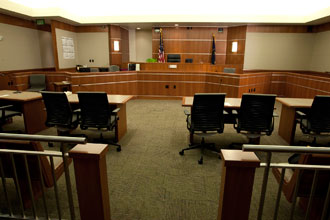 By Jamie Kinkaid
By Jamie Kinkaid
Cordell & Cordell Divorce Lawyer
When children are involved in a divorce case, two separate sections tend to exist in the court order: child support and child custody.
Court orders are meant to be followed, however, when an individual cannot or will not follow the order, there are proceedings to bring them into compliance, or “punish” the offending individual. These proceedings are different depending on the violation, and the disparity between enforcement is evident.
Child Support Enforcement
With a violation of the child support order, the enforcement can be brought about privately, by hiring private counsel, or it can be brought about by utilizing your local child support enforcement office.
Sometimes the individual will not have to ask for assistance. For instance, if the offender has met certain thresholds for noncompliance, like a failure to pay for six consecutive months, the enforcement or recovery office may step in and seek to enforce the child support order without prompting from the other party.
In the event the enforcement or recovery office steps in, depending on the jurisdiction, several penalties may be enforced administratively or “extra-judicially” without even the need for judicial intervention or a hearing in court.
For instance, the offending individual may receive notice that their driver’s license is being suspended, their passport is being confiscated, their vehicle is being repossessed, a lien has been placed on their property, or that there are subject to the federal tax intercept program (seizure of their federal tax return). It is not uncommon to have bank accounts confiscated, also.
The individual may receive notice that they can request a hearing, but the failure to do so will automatically result in the punishment. Ignoring these notices can be both financially disastrous and lead to further issues with law enforcement. Although you may have the right to a hearing, a hearing is not necessary to complete the act in these proceedings.
Whether an individual applies for assistance, the state begins proceedings of their own volition, or an individual hires private counsel, an action for contempt may also be instituted to obtain enforcement of child support.
The failure to follow a court order runs the risk of a possible contempt or show cause action. A party, who has not followed the order will be asked to appear in front of the judge and explain, or “show cause,” why they should not be held in contempt of court for their failure to follow the court order.
In order to be held in contempt, it is the burden of the party who has been aggrieved to show that such failure to follow the order was both “willful” and “contumacious.” Should the court find the party who failed to follow the order is in contempt, they will then be punished.
A judge typically has the discretion to determine what the best option for punishment is when a party is found to be in contempt.
In every jurisdiction the penalty is different. It can result in fines, a date to come to into compliance, attorney’s fees, and/or jail time.
 It is also possible to have the judge order a “purge plan.” A purge plan is a financial plan of sorts that requires the party who has been found to be in contempt to not only pay the amount ordered for support each month, but it also requires an additional payment to pay any outstanding delinquent amounts due, arrearages, and interest.
It is also possible to have the judge order a “purge plan.” A purge plan is a financial plan of sorts that requires the party who has been found to be in contempt to not only pay the amount ordered for support each month, but it also requires an additional payment to pay any outstanding delinquent amounts due, arrearages, and interest.
If a person cannot afford an attorney to assist in their defense against the allegations then a court-appointed attorney may be available to a person who has been served with a contempt proceeding regarding child support.
Some jurisdictions not only provide court appointed counsel for the initial proceedings to establish child support, they also provide court appointed counsel if you have violated the child support provisions of the order if you meet the application requirements.
An individual can also hire his or her own child support lawyer of their choosing. The court-appointed lawyer is typically used in jurisdictions that could offer jail time as one of their punishments.
It is imperative to note that in some jurisdictions you can be charged with criminal charges for a failure to provide child support.
Related Articles:
Child Custody and Visitation Interference Enforcement
When dealing with the enforcement of visitation, there are less options regarding assistance, though the range of punishments is limitless.
Rather than request assistance from a local authority or wait for an agency to step in, visitation is treated as a civil matter. Typically you will not receive law enforcement help to enforce visitation, unless a court order specifically states that law enforcement shall assist and/or intervene.
 Therefore, an individual must either choose to hire their own lawyer or attempt to maneuver the legal system on their own based on the categorization of visitation being a “civil matter.”
Therefore, an individual must either choose to hire their own lawyer or attempt to maneuver the legal system on their own based on the categorization of visitation being a “civil matter.”
It is not likely either party will be provided with court appointed counsel for the proceedings to enforce visitation, at least where I practice. Further, fewer and fewer legal aid facilities offer assistance in the domestic realm of cases involving visitation and custody.
Therefore, the enforcement then becomes a matter of the ability of a party to afford representation to enforce the order. If an individual is not comfortable or savvy enough to file for enforcement on their own, and cannot afford to hire counsel, they typically are without a way to enforce the visitation.
It should be noted, some states are will allow the police to intervene or institute criminal statues for visitation violations. Further, the U.S. Department of Health and Human Services Division of Children and Families now offers grants to states to help facilitate access and visitation as between a non-custodial parent and their children. How the states choose to use the grants they apply for is relatively discretionary, however.
The procedure to enforce visitation is the same as the contempt or show cause action described for child support. However, there is no extra-judicial or administrative enforcement, as described above regarding items such as driving privileges. More so, the punishments are typically very different.
A finding of contempt in a civil action involving visitation can result in loss of parenting time for a specified period of time, awarding additional parenting or holiday time to the aggrieved parent, fines, a date to come to into compliance, attorney’s fees, a change in custody, appointment of a guardian ad litem, appointment of an attorney for a child, and in rare occasions, jail time.
The court is only limited by its creativity in deciding what the party who has been found in contempt shall receive as punishment.
Related Article:
Disparity In Enforcement
It is evident that the enforcement of child support and visitation are treated separately in the civil system and the disparity of enforcement is apparent.
Through both the financial ability to enforce, the variety of punishments, and access to remedies that extend the judicial system to administrative matters, there is no clear-cut definition as to how the proceedings will be handled.
One might argue that the disparity evidences the financial responsibility of rearing a child is held in higher regard than the emotional responsibility of a child.
One might also argue that the reason for enforcement in cases involving non-support are to keep the tax dollars at a minimum for providing social welfare services for children who are not being supported. More so, states are required to engage in support enforcement to maintain their federal funding for social services under federal law.
Regardless, court orders should be followed and the failure to receive child support does not warrant withholding visitation and vice versa.
It is best to follow your court order, and in the event either party is failing to comply, seek more in depth advice from a men’s divorce attorney to discuss the enforceability of your order.
Cordell & Cordell:
 To arrange an initial consultation to discuss divorce rights for men with a Cordell & Cordell attorney, including Omaha, Nebraska Divorce Lawyer Jamie Kinkaid, contact Cordell & Cordell.
To arrange an initial consultation to discuss divorce rights for men with a Cordell & Cordell attorney, including Omaha, Nebraska Divorce Lawyer Jamie Kinkaid, contact Cordell & Cordell.


If my granddaughter is separated from her husband and he has the Children and no custody order if he won’t give them back is that legal she has a case filed for chid support with the attorney generals office she let him have them for the weekend and he won’t let her talk to them on the phone she has proof of the agreement Thank You
X girlfriend has not seen my children over 6 months and we have a court arrangements 50/50 she had custody of them living with her but since late June she just dropped them off to me and hasn’t seen them since and I cannot find her or get a hold of her at all …any suggestions